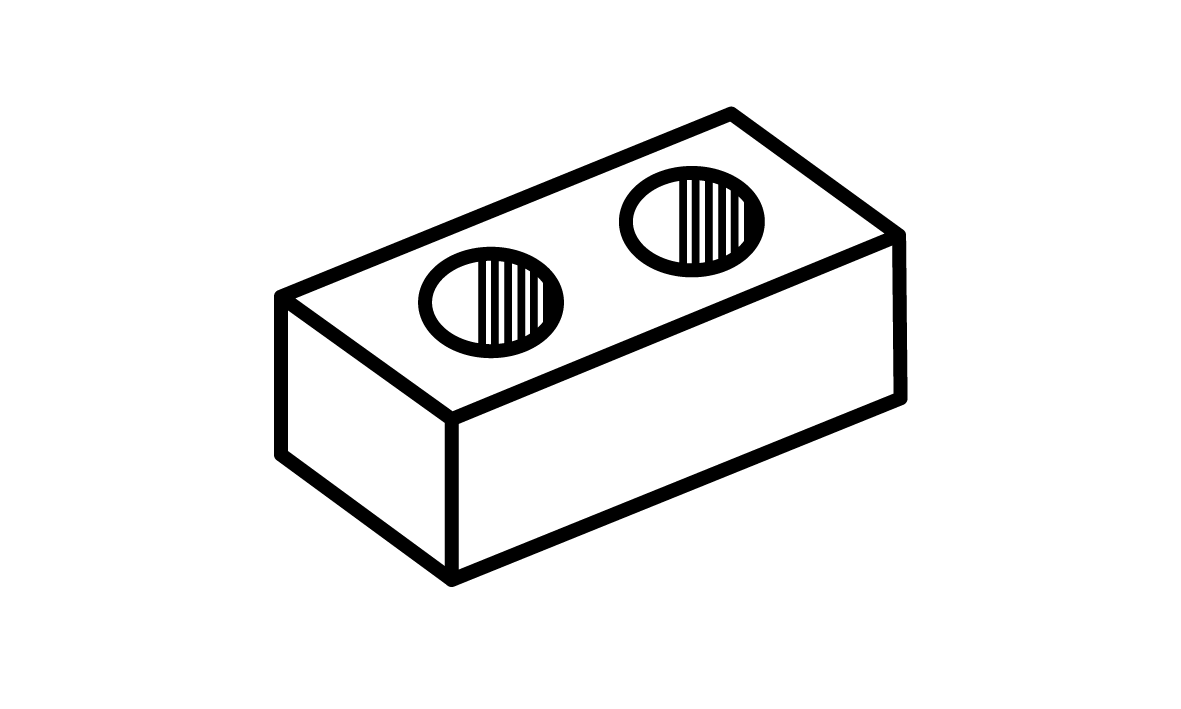Five-question interview with Feix and Merlin for Built By Us
We’re excited to share the second instalment of 5QI where we get to meet amazing practitioners and advocates of Inclusive Environments. This month, we are featuring the brilliant Julia Feix and Tarek Merlin of (Feix & Merlin).
How does being an LGBTQ+ led practice, inform your approach?
A few years ago, we took the decision to update the home page on our website. Sounds like a fairly mundane and everyday thing to do, right? Except for us, it turned into quite a poignant and meaningful move, whilst at the same time, one of those things that once done you look back on and think, that was actually exactly what we should have had on there all this time, and just felt perfect, authentically, ‘us’.
The homepage on our website used to read something like, “We are a design-led architecture practice based in London…” which you know, what did that really mean, who are we, actually?
The homepage on our website now reads “We are an LGBTQ+ led design practice based in the Bussey Building in Peckham. We work with great clients who share our values.”
Understanding our roles and responsibilities in a small practice, leading a team, and being part of our own internal cultural leadership, we felt it imperative that we recognise the importance of what we do and say internally to match what we do and say externally. And similarly, understanding our role and position within the profession, and even outside it, acting as a role model to others, led us to this idea of visibly and proudly being our authentic selves.
Be yourself, you literally can’t be anyone else. And the more authentic you are the more authentic the relationship with everyone else that surrounds you, becomes. Clients, team members, consultants. And the more authentic your relationship is with others, the more successful the work you do together can be.
2. Tarek, you've been an advocate for change in architecture, writing pieces on the need for change regarding working for free and public procurement. What would you say is the most urgent area for change in the industry?
A lot of improvements have been made in procurement since first writing the articles in the AJ, and the workshops and roundtables we held, essentially on how we can do procurement better. And we have noticed some improvements in the way some procurement briefs are written actually; removing some of the barriers to entry for small practices in particular, such as minimum turnover thresholds and unrealistically high insurance premiums.
Indeed, we have noticed that now some briefs come with maximum thresholds instead of minimums, encouraging smaller practices to enter, levelling the playing field. In addition, some of the larger masterplan type bids come with requisites that the team must include smaller practices from underrepresented groups; and we’ve had experiences now where local authority clients are asking that larger practices engage with smaller local practices as part of their teams on larger projects. A few good examples of all the good things we have been advocating for over the years, which together in some small way help to create greater diversity and inclusion on larger projects.
That being said, there is still definitely some room for improvement in procurement. The level of complexity and confusion, and even basic typos that abound in bid documents surprises even me, and I am the king of typos. The time spent simply deciphering the briefs can run into many hours, before even deciding whether or not to enter in the first place.
One standard simple online and public pre-qualification process, with all the standard questions, (with such in-depth probing questions as confirming your company registration number and whether or not you have a Health&Safety policy), is needed. Instead of spending hours filling all of this out each and every time, for each and every SQ (which are, by the way, always in slightly different formats and sequences to each other so you have to do it differently each and every time), you are instead only spending time responding to the one question that is ultimately at the heart of every evaluation process; are you the right architect for this job? I understand the industry is moving towards this, with some online portals in Wales and elsewhere but it’s not national or standard yet and we need to get there. So much time is wasted on this, and nothing troubles me more than time wasted.
And is the word procurement the right word when we are talking about architectural services anyway? This is not toilet paper you are buying here, it's architecture. “Commissioning” might be a better word, in my opinion, as in commissioning a piece of work from the creative world, rather than buying a product from a shelf in the utility cupboard.
One of the things I have never been able to understand about the profession is giving work away for free and/or going to great efforts of creating a fee proposal for a project, at a loss. We are the only profession I know that does this and seems to do this and do it willingly. Literally makes no sense. It’s short-sighted, self-destructive, and damaging to everyone else in the profession.
At F&M we tend to avoid any unpaid or low-paid competition, especially where there is a significant level of design required. We of course will help a client out with a quick look at a site, and we do enter invited competitions (which tend to have honorariums attached) that’s I think fair and reasonable, but this idea that we should all be working, without fee, to win jobs is just an outdated, outmoded model that needs to stop. We all need to play our part in that. Clients and institutions and architects alike.
If we all agree we should be responsible employers, rewarding our teams with good levels of pay and remuneration, with good work-life balance, then we must stop succumbing to these exploitative practices in the profession.
3. Congratulations to you for becoming RIBA's Practice of the Month (Feb 2023)! And to Julia for being a panel for the Female Frontiers Awards. How do you find the notion of being "role models" for students & the industry?
Thank you – [Taking part in the awards] was an incredibly inspiring experience. It was very rewarding being one of the panel judges, and I was very glad to be helping to support and celebrate the successes of women in the industry, all doing fantastic and pioneering things
We have always understood the importance of representation and visibility, and we are very proud and honoured to be seen as role models for anyone in the industry. And yes, especially for students who, as we all do, look for examples in the profession that look like them, and if they don’t see them, they can be put off. So it’s especially important for younger people studying and thinking about a career in architecture and construction, that we are as visible and prominent as we can be, to help in our own small way to diversify and make the profession more welcoming and inclusive.
And it’s really important to me, personally, in terms of advocating for women’s advancement in the profession and the construction industry in general. I lead a lot of projects on site and still sometimes have to battle with the occasional glance over my shoulder, waiting for the man in charge to come into the room, and sometimes have to navigate awkward conversations, deal with ‘banter’ and some people not listening to my responses properly, making yourself heard is one of the hardest things. I am not too phased by any of this now, but it still annoys me hugely. I just deal with it calmly as and when, which means confronting the person about their behaviour or language.
A simple question like “What do you mean by that” is often enough to make people check themselves, but I’m not going to lie – that is something that can be daunting if someone is less experienced, or less able to respond well difficult situations.
We have spoken publicly about how we can all play a part in helping to call this out as it happens, and all people in the room need to support one another and speak up. It’s the only way to slowly but surely correct bad behaviour but we do rely on everyone to do it when they can, even if it creates an atmosphere for a moment or you feel like people are rolling their eyes at you – it’s always worth it. Call it out!
We were very excited to be RIBA London's Practice of the Month, and for February in particular, as it was LGBT+ History Month. It was particularly poignant this year, as for the first time ever, the number of lesbian, gay, bisexual, trans and asexual people in England and Wales has been counted in the official Census 2021.
This is important for so many reasons, not just simply for representation, but with the LGBTQ+ community now visible in data, organisations can better understand national demographics and therefore improve the lives of LGBTQ+ people with a data-based approach.
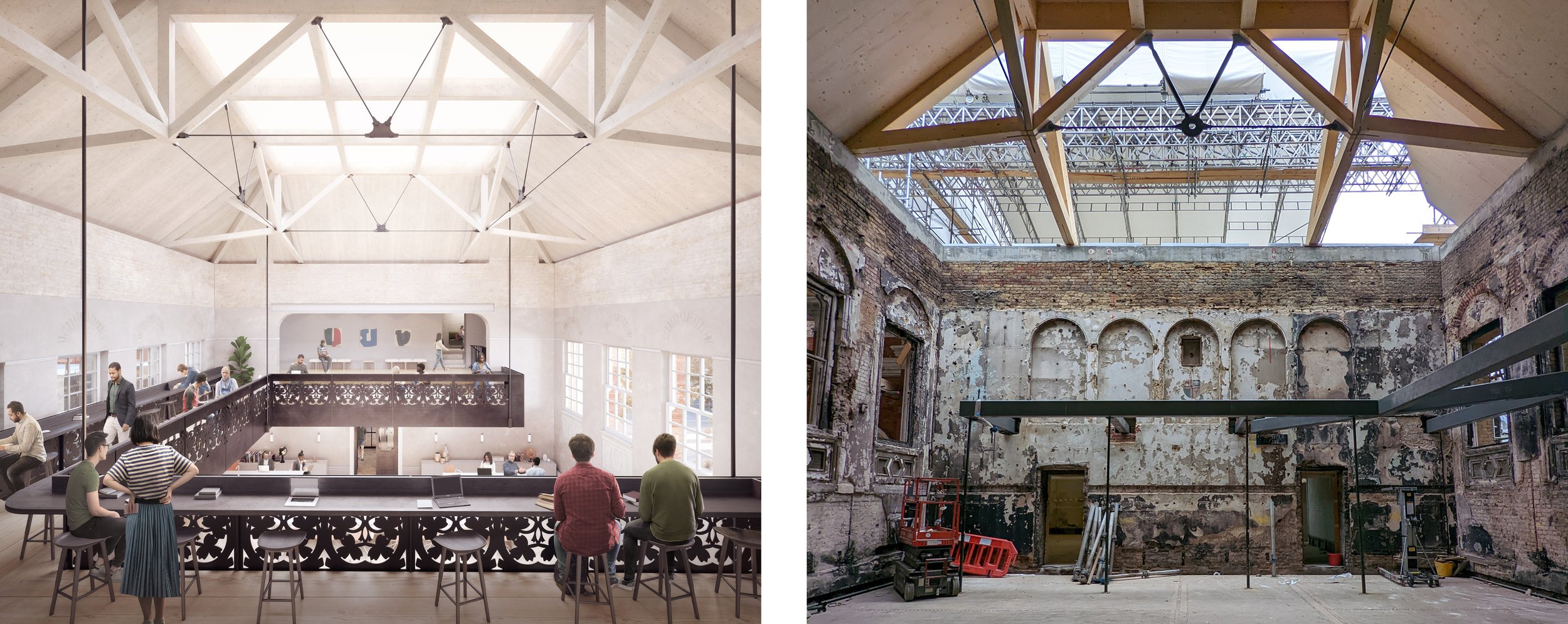
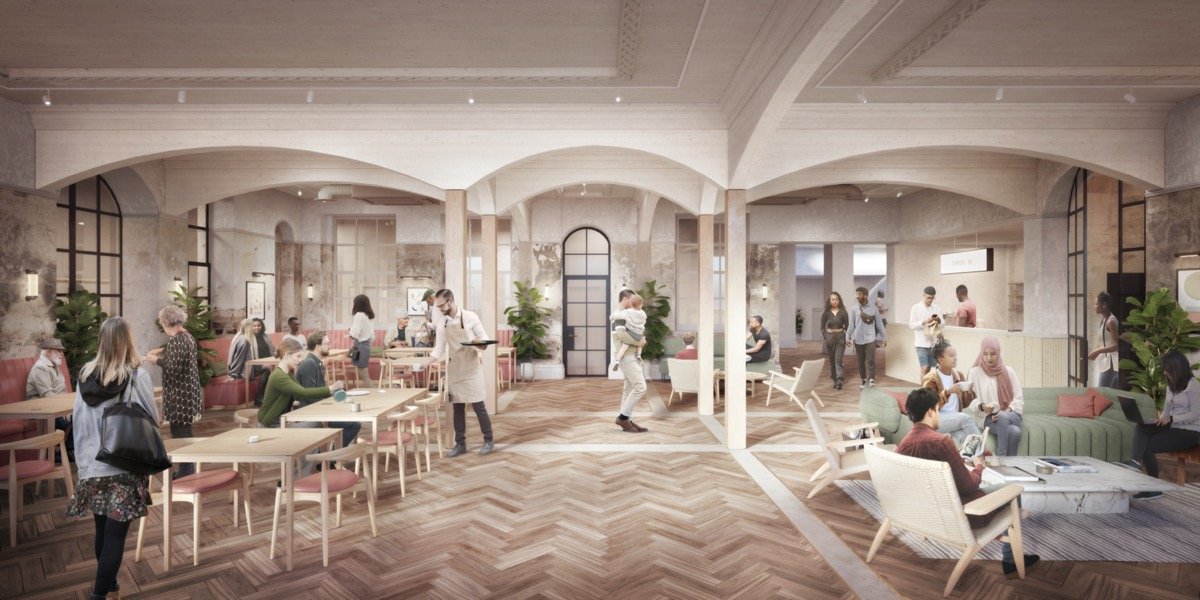
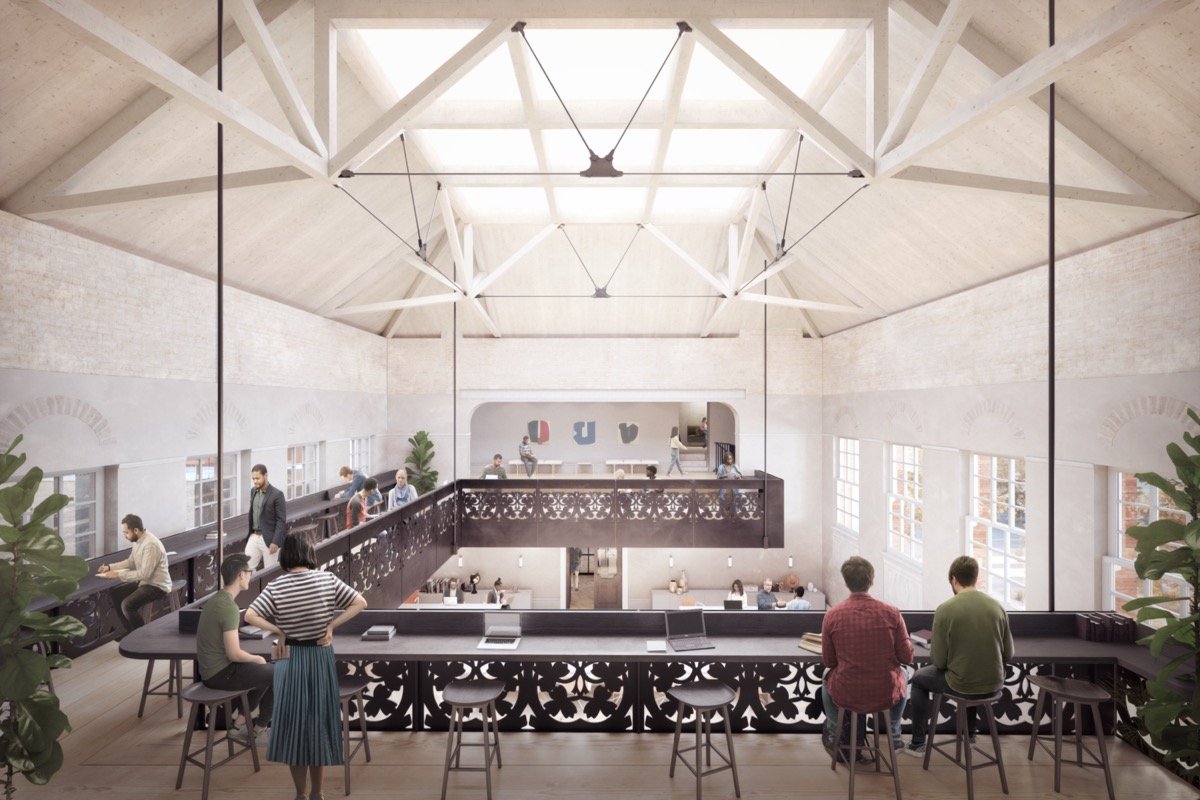
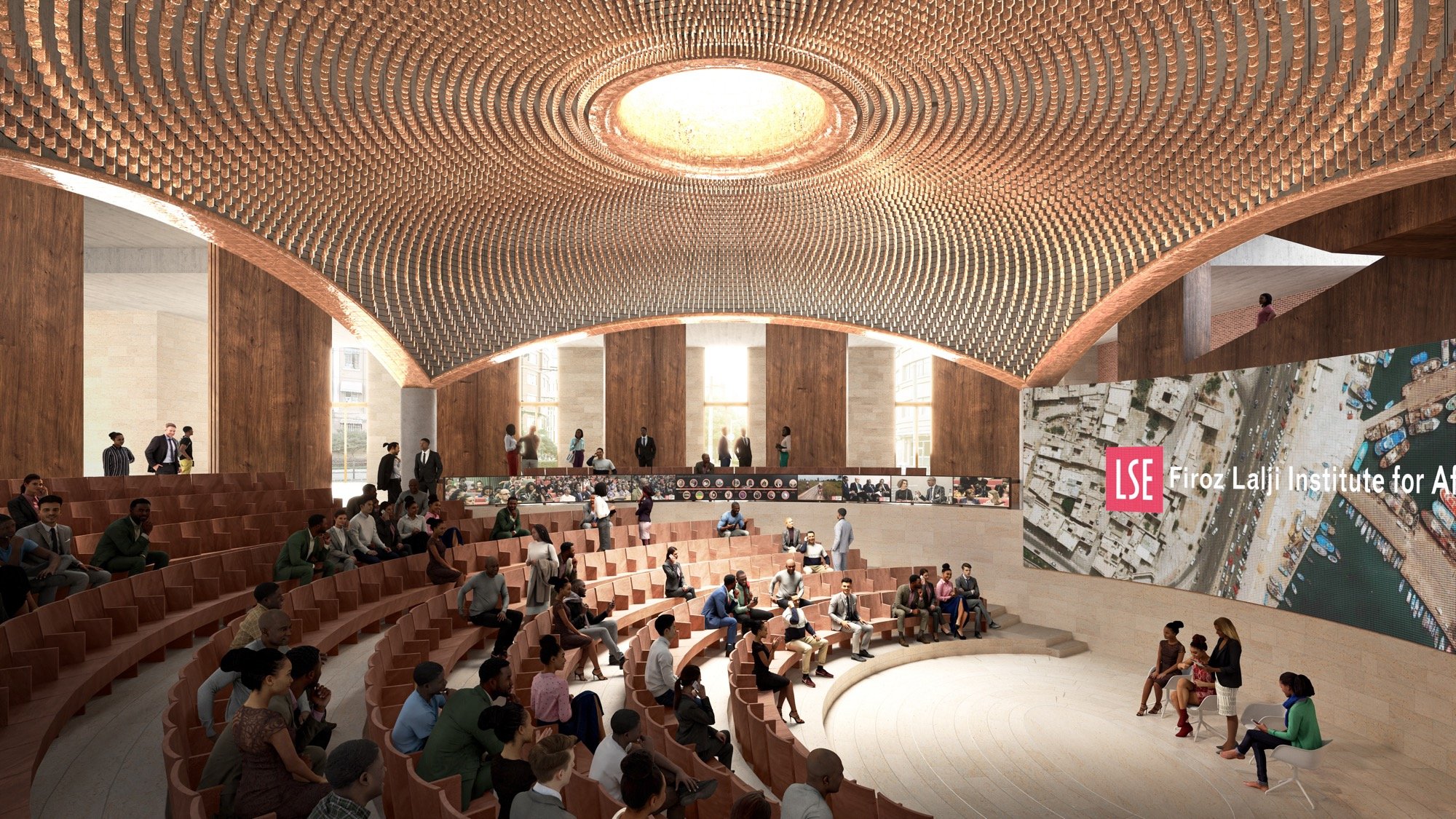
4. Tarek, opening a cafe with your partner Mark is an exciting move - how have you found the experience? What inspired the move?
Thank you yes, Corner, our coffee shop and art gallery in New Cross has been an amazing project and actually was a real family affair, involving everyone at Feix&Merlin in the design and fit-out process. Honestly, we couldn’t have done any of it without the support of the team at F&M. We see it very much as a creative extension of the studio, with events and exhibitions that everyone comes to, and most importantly they all get special F&M friends and family discount on the coffee and cakes My partner, Mark, is actually also in charge of operations at F&M, part-time, and manages all of the day-to-day operations at Corner so it all makes perfect sense. Mark has a brilliant logistical mind that perfectly balances mine, which is not. Much in the same way my relationship with Julia is perfectly balanced; she has a brilliantly detailed mind, which I do not. ;)
Halfway through the fit-out works, we took the decision to add the letters LGBTQ+ on the windows of the shopfront, (similar, I suppose, to the decision to put the LGBTQ+ statement on the F&M website homepage), but at the time we weren’t honestly sure why, just that we felt it was an important thing to do. It has since proved itself to be one of the most interesting and quietly powerful things we could have done, leading to some wonderfully poignant and engaging conversations, and everyday moments, that just simply would not have happened otherwise.
The words are not there as a political statement nor are they there to separate or exclude anyone, it is not an exclusive space, and everyone is welcome in every sense, but it also is very important that we make it clear that, here we support and celebrate the LGBTQ+ community, in all its different intersectionalities; we are welcoming, inclusive and diverse, and that we all share these values here.
At the end of last year, we successfully crowdfunded for a large mural on the side wall of our building, with everyone we know with everyone from the local community to the broader architectural community, other architects, clients and suppliers, all coming together to help fund the work. The artwork, by local artist collective 34Bus, was inspired by the LGBTQ+ community and sought to explore how we are all connected by our shared differences, not separated by them.
The basement art gallery at Corner is also a really exciting element of the space. The idea is to bring the world of art and architecture closer together. We operate in the same orbits but tend not to mix enough. The first exhibition, Still 2022 was a light and sound installation that sought to create architecture out of light. We have also had some more conventional fine art exhibits, and coming up is the launch of Looking for Light, a photographic exhibition, exploring the male nude and the themes of identity and acceptance.
Opening night of Looking for Light by Stuart Alexander Carruthers Thurs 27th April from 6 pm at Corner 117 New Cross Road.
5. What do you have coming up that we should keep an eye out for?
Walworth Town Hall completes at the end of this year/early next and will become a wonderful new addition to the area and a destination for Southwark. Honestly, this building is just beautiful, and all the new interventions made are starting to transform it into something truly exceptional, can’t wait to welcome everyone in.
Our collaboration with David Chipperfield Architects, The Firoz Lalji Institute for Africa, for the LSE, (won by competition last year) is going well and steaming through early design stages led by DCA. It’s a big and complex retrofit, like Walworth Town Hall, and we are making some big and complex interventions. This project will be an exemplary project – how to do really good retention and adaptive reuse, (retaining about 60% of the existing building) and taking what is admittedly a fairly unremarkable building, and transforming it into a world-class global hub for education.
And it’s not only about London, we love working outside of London and even further afield. We are on-site in Birmingham, with a large new-build housing project right in the centre of the Jewellery Quarter, we just finished a hotel in Amsterdam, on-site with the interiors for a big new-build hotel in Hamburg, and are working on a new concept for a hotel in Dusseldorf, more on that to come!
Lots of exciting things happening, in a bright new inclusive, and equitable future! A work in progress! ;)
